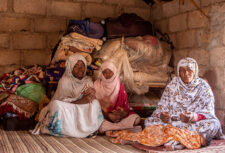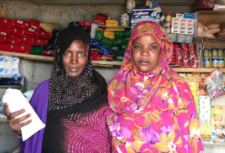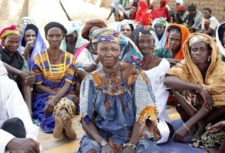Disclaimer: This article is more than 13 years old, and may not include the most up-to-date information or statistics. Please verify information with more recent sources as needed, and if you have any questions contact our Press Office.
7 April 2011
A hunger strike by anti-slavery activists has forced Mauritanian government officials to arrest three women accused of holding children in slavery in the capital Nouakchott. This is the first time that anyone has been charged with the crime of slavery since the practice was criminalised in Mauritania in 2007.
Slavery in Mauritania has existed for centuries and involves the enslavement of Arabic speaking descendants of black Africans by their Arab-Berber ‘White Moor’ masters. Local anti-slavery groups estimate 18 per cent of the population or 600,000 people are born and continue to live in slavery.
The charges of slavery were brought against Salka mint Hamed, Fatimetou mint Cheikh Seyyidi and Mettou mint Abdallahi ould Abdennoune on Sunday 27 March. The victims were 11-year-old Salka Mint Ahmed, 13-year-old Meima Mint Amar and 14-year-old Houeyja Mint Mohamed Lemine.
The three children were born into slavery and ‘belonged’ to the extended family of the three women. They were sent to Nouakchott from their rural villages around two years ago to become child domestic workers, spending all day, every day cleaning the homes of the women.
The charges were only brought after the heads of three Mauritanian anti-slavery organisations went on hunger strike to demand justice. The hunger strike began continued for 48-hours before the state prosecutor finally agreed to bring charges against the three women. All of the accused await trial next month.
The hunger-strikers included Boubacar Messaoud and Mariem mint Enneyni from SOS Esclaves, Biram Dah Abeid from the Abolitionist Resurgence Initiative (IRA) and Aminétou mint El Moctar from Action for Female-Headed Households (AFCF).
Sarah Mathewson, Anti-Slavery International’s Africa Programme Co-ordinator, said: “The Mauritanian authorities must make sure that their own laws are implemented on the ground to guarantee that all slavery cases are pursued and brought before a court. If these women are found guilty of slavery it is important they are punished with the full force of the law in order to send a strong message that slavery is no longer tolerated in Mauritania.”
Boubacar Messaoud, President of SOS Esclaves, said: “This is the first time that we have seen the authorities pursue a slavery case this far and we will keep up the pressure to make sure that the trial takes place. SOS Esclaves is recommending that the government also looks to amend the slavery law to ensure that the onus on proof is not on the victim to prove that they were in slavery. It is also necessary to allow civil society organisations to bring cases directly rather than rely on the victims of slavery, who may be too traumatised to seek justice.”
To for further information or a press pack on slavery in Mauritania, contact: Paul Donohoe, Anti-Slavery International Press Officer, 020 7501 8934 p.donohoe@antislavery.org
Notes for Editors
Anti-Slavery International is the world’s oldest human rights organisation and campaigns for the eradication of slavery, exposing current cases, supporting local organisations to release the minimum 12.3 million people in slavery, and the implementation of international laws against slavery. www.antislavery.org





